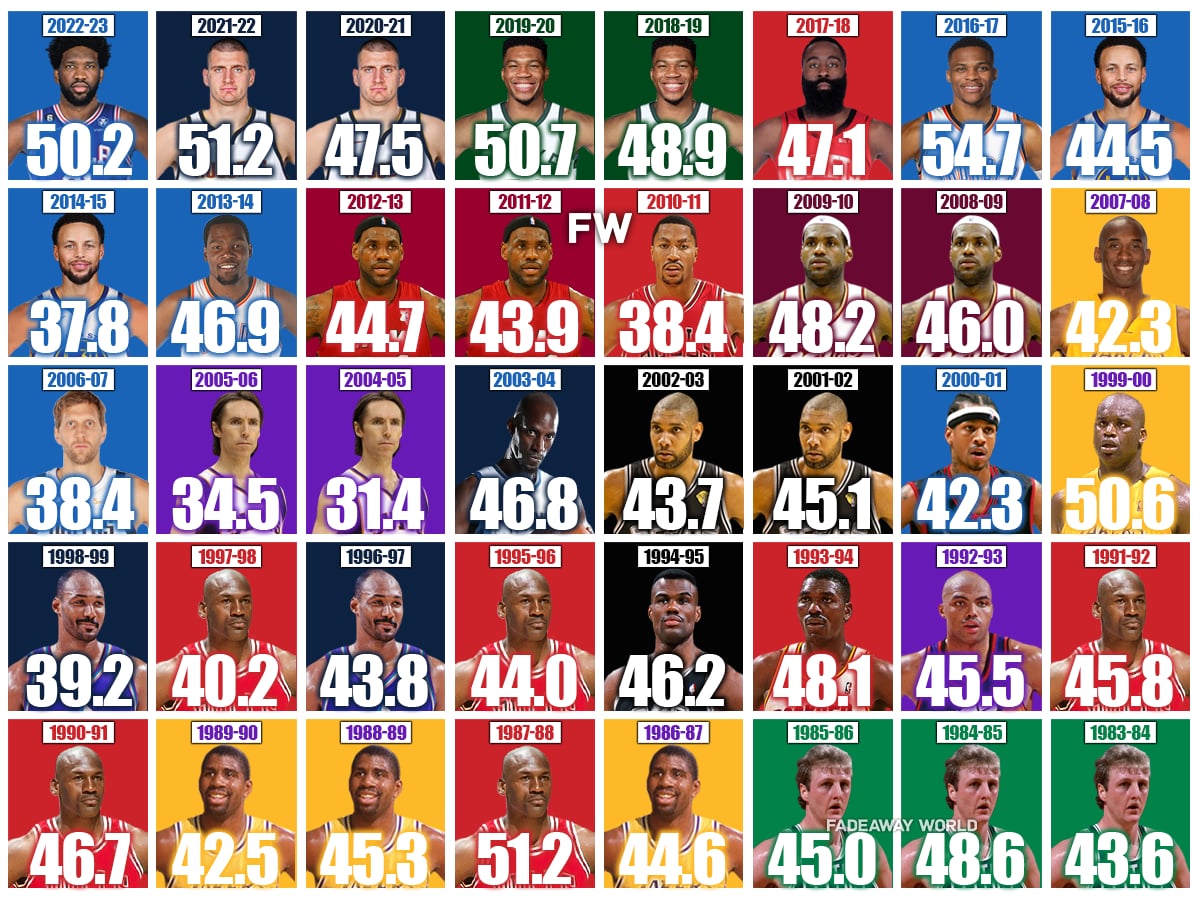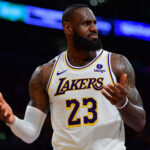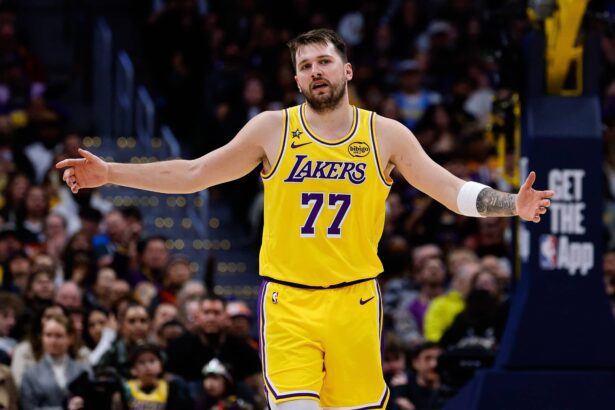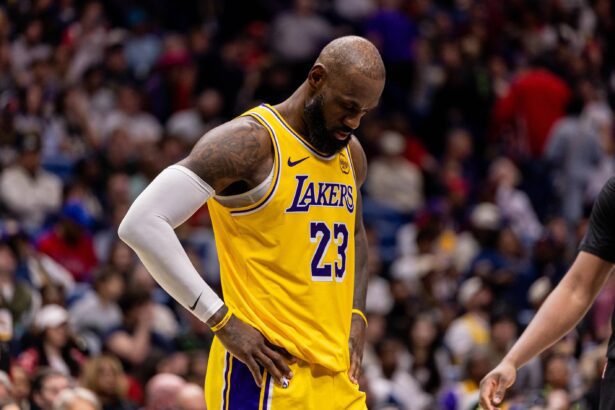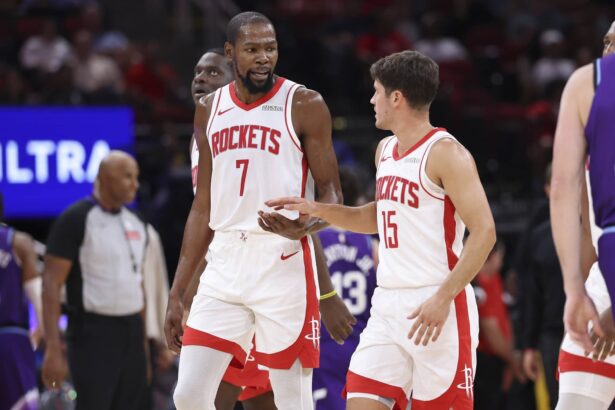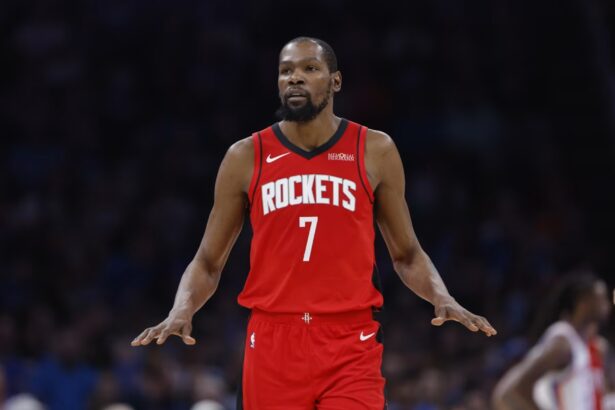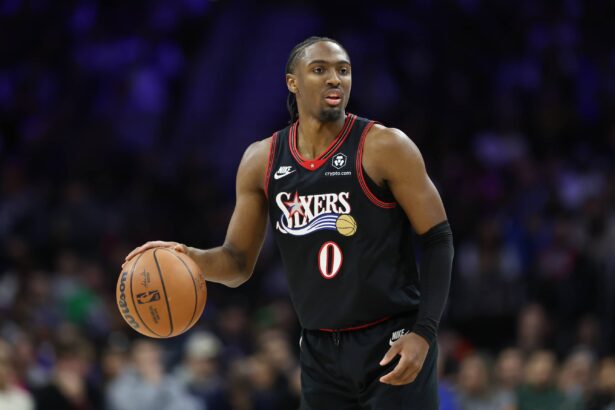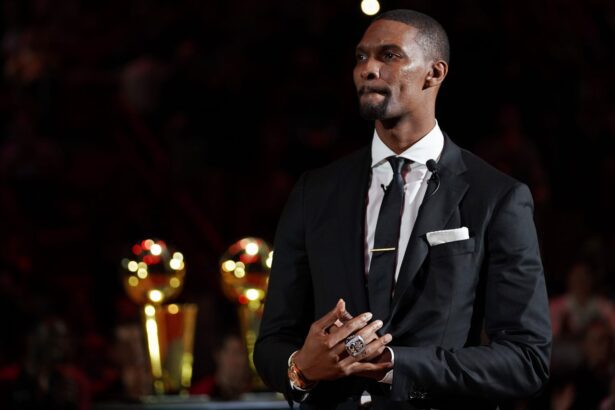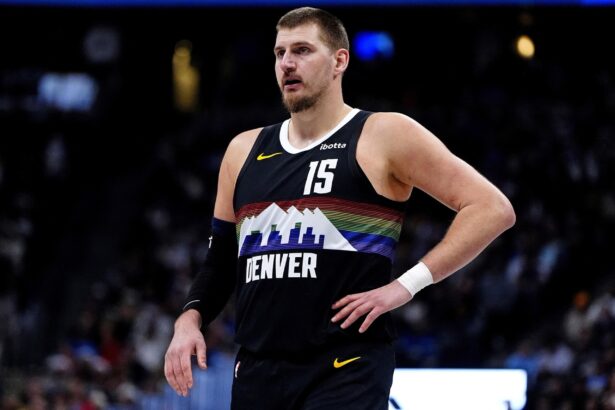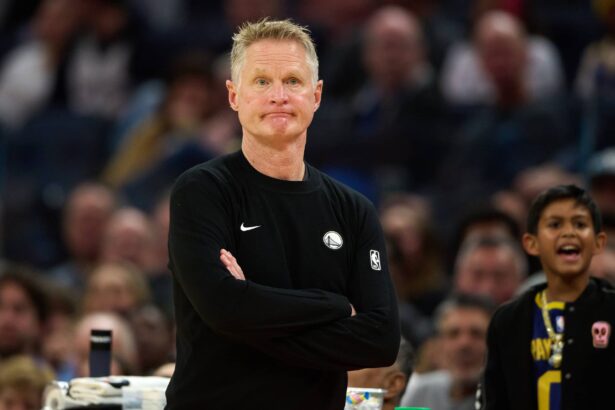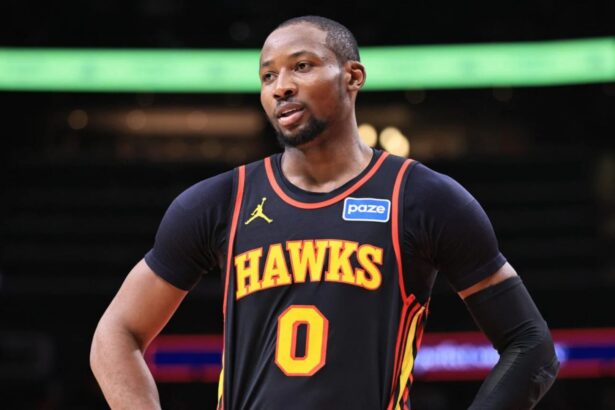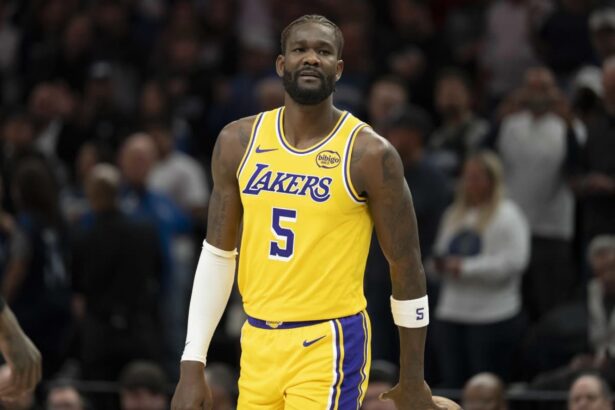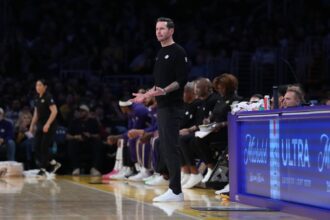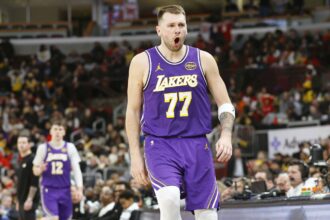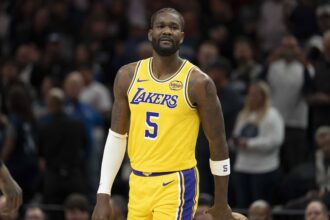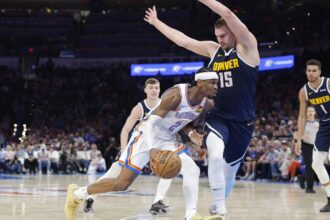NBA legends like Michael Jordan, Magic Johnson, and Larry Bird, as well as modern-day superstars like LeBron James, Stephen Curry, and Nikola Jokic, have won MVP awards while posting incredible statistics. We will combine the stats of every NBA MVP over the past four decades, starting with Larry Bird in 1983-84 and ending with Joel Embiid in 2022-23.
Rules: Total Score is a combination of PPG, RPG, APG, SPG and BPG
1983-84 – Larry Bird – 43.6 Score
Stats: 24.2 PPG, 10.1 RPG, 6.6 APG, 1.8 SPG, 0.9 BPG
Larry Bird captures his first of three straight MVP awards in the 1983-84 season, as the last player in history to achieve such a feat. The Celtics finished with 62 wins in the season, ranked 1st in Net Rating (+6.5), and were the best team in the league because they went on to defeat the Lakers in the Finals. No doubt, everyone in the 1980s excluding Magic Johnson was living in Larry Bird’s world.
1984-85 – Larry Bird – 48.6 Score
Stats: 28.7 PPG, 10.5 RPG, 6.6 APG, 1.6 SPG, 1.2 BPG
Larry Bird led the Boston Celtics to a 63-19 record, showcasing his exceptional scoring, rebounding, and playmaking abilities. He had numerous memorable performances throughout the season, including a 60-point game against the Atlanta Hawks. Bird’s leadership and versatility were instrumental in the Celtics’ success, although they lost in the Finals against the Lakers.
1985-86 – Larry Bird – 45.0 Score
Stats: 25.8 PPG, 9.8 RPG, 6.8 APG, 2.0 SPG, 0.6 BPG
Bird won his third straight MVP award in the 1985-86 season, posting 25.8 points and 9.8 rebounds per game. The Celtics won 67 games again and made it to the Finals, this time defeating the Rockets in six games. Bird capped off his historic campaign with a Finals MVP trophy as well.
1986-87 – Magic Johnson – 44.6 Score
Stats: 23.9 PPG, 6.3 RPG, 12.2 APG, 1.7 SPG, 0.5 BPG
Magic Johnson took home the MVP trophy, leading the Lakers to an NBA Championship against the Boston Celtics. He averaged close to a triple-double throughout the season and was named Finals MVP after a dominant performance against the Celtics. His ability to control the game and elevate his teammates was on full display all season long.
1987-88 – Michael Jordan – 51.2 Score
Stats: 35.0 PPG, 5.5 RPG, 5.9 APG, 3.2 SPG, 1.6 BPG
Michael Jordan had one of the most remarkable scoring seasons in NBA history, averaging 35.0 points per game. He won his first MVP award while leading the league in scoring, steals, and minutes played while also winning Defensive Player of the Year. Jordan’s scoring outbursts and highlight-reel plays captivated fans and solidified his status as a basketball icon.
1988-89 – Magic Johnson – 45.3 Score
Stats: 22.5 PPG, 7.9 RPG, 12.8 APG, 1.8 SPG, 0.3 BPG
Magic Johnson’s playmaking brilliance was once again on display as he guided the Lakers to another NBA Finals appearance, although they fell to the “Bad Boy” Pistons in a 4-0 sweep. During the season, Magic continued to average double-digit assists and showcased his versatility by contributing in all aspects of the game. Johnson’s leadership and clutch performances were crucial for the Lakers’ success, as the team won 57 games.
1989-90 – Magic Johnson – 42.5 Score
Stats: 22.3 PPG, 6.6 RPG, 11.5 APG, 1.7 SPG, 0.4 BPG
Magic Johnson continued to dominate as one of the league’s premier playmakers, leading the Lakers to another 60-win season (63-19). He averaged over 20 points and 11 assists per game, showcasing his ability to score and create opportunities for his teammates. Johnson’s basketball IQ and unselfish play were key factors in the Lakers’ success, even if their season ended in the second round of the playoffs against the Phoenix Suns.
1990-91 – Michael Jordan – 46.7 Score
Stats: 31.5 PPG, 6.0 RPG, 5.5 APG, 2.7 SPG, 1.0 BPG
Michael Jordan led the Chicago Bulls to their first NBA Championship, averaging 31.5 points per game while also excelling on defense with 2.7 steals per game. His iconic switch-handed layup in the NBA Finals against the Lakers just encompasses what the Bulls guard did during the year. If Jordan wasn’t legendary enough already, his first championship run was iconic.
1991-92 – Michael Jordan – 45.8 Score
Stats: 30.1 PPG, 6.4 RPG, 6.1 APG, 2.3 SPG, 0.9 BPG
Michael Jordan continued his dominance, leading the Bulls to their second consecutive NBA Championship. He averaged over 30 points per game and showcased his versatility by contributing in rebounding and assists. Jordan’s leadership and competitive spirit were instrumental in the Bulls’ success, as the team won 67 games and lost only seven games in the playoffs.
1992-93 – Charles Barkley – 45.5 Score
Stats: 25.6 PPG, 12.2 RPG, 5.1 APG, 1.6 SPG, 1.0 BPG
Charles Barkley had a career-best season, leading the Phoenix Suns to the NBA Finals and winning his first and only MVP trophy. He averaged 25.6 points and 12.2 rebounds per game while also showcasing his playmaking ability. Barkley’s MVP season was highlighted by his tenacity, scoring outbursts, and memorable playoff performances, but he fell short against Jordan and the Bulls in the Finals.
1993-94 – Hakeem Olajuwon – 48.1 Score
Stats: 27.3 PPG, 11.9 RPG, 3.6 APG, 1.6 SPG, 3.7 BPG
Hakeem Olajuwon had a dominant season, leading the 58-24 Houston Rockets to their first NBA Championship in the absence of Michael Jordan due to his retirement. He averaged 27.3 points, 11.9 rebounds, and an incredible 3.7 blocks per game. Olajuwon’s MVP season was defined by his exceptional post-play, defensive prowess, and clutch performances in the playoffs.
1994-95 – David Robinson – 46.2 Score
Stats: 27.6 PPG, 10.8 RPG, 2.9 APG, 1.7 SPG, 3.2 BPG
David Robinson had a historic season, becoming the first player since Kareem Abdul-Jabbar to win the scoring title and Defensive Player of the Year in the same season. He averaged 27.6 points, 10.8 rebounds, 3.2 blocks, and 1.7 steals per game. Robinson’s MVP season was highlighted by his all-around excellence and dominant performances on both ends of the floor for the 62-win Spurs.
1995-96 – Michael Jordan – 44.0 Score
Stats: 30.4 PPG, 6.6 RPG, 4.3 APG, 2.2 SPG, 0.5 BPG
Michael Jordan returned from his brief retirement to reclaim his throne as the NBA’s best player. He led the Chicago Bulls to a then-record 72-win season while averaging 30.4 points per game. Jordan’s MVP season was punctuated by his scoring outbursts, including a 53-point game against the Detroit Pistons and his iconic Finals performances against the Seattle SuperSonics.
1996-97 – Karl Malone – 43.8 Score
Stats: 27.4 PPG, 9.9 RPG, 4.5 APG, 1.4 SPG, 0.6 BPG
Karl Malone had a standout season, leading the Utah Jazz to a franchise-best 64-18 record. He averaged 27.4 points and 9.9 rebounds per game while also contributing 4.5 assists per game. Malone’s MVP season was highlighted by his consistency, durability, and leadership, guiding the Jazz to the NBA Finals for the first time in franchise history but they fell to Jordan and the Bulls which would become a consistent ending.
1997-98 – Michael Jordan – 40.2 Score
Stats: 28.7 PPG, 5.8 RPG, 3.5 APG, 1.7 SPG, 0.5 BPG
Michael Jordan continued his legendary career with another MVP season, leading the Chicago Bulls to their third consecutive NBA Championship. He averaged 28.7 points per game and was named Finals MVP for the sixth time in his career. Jordan’s MVP season was defined by his scoring prowess, clutch performances, and leadership, solidifying his status as the greatest player of all time.
1998-99 – Karl Malone – 39.2 Score
Stats: 23.8 PPG, 9.4 RPG, 4.1 APG, 1.3 SPG, 0.6 BPG
The 35-year-old Karl Malone continued to defy Father Time with another stellar season, leading the Utah Jazz to the best record in the lockout-shortened season. He averaged 23.8 points, 9.4 rebounds, and 4.1 assists per game. Malone’s MVP season was highlighted by his efficiency, scoring ability, and leadership, guiding the Jazz to 37 wins in a lockout-shortened season that only featured 50 games.
1999-00 – Shaquille O’Neal – 50.6 Score
Stats: 29.7 PPG, 13.6 RPG, 3.8 APG, 0.5 SPG, 3.0 BPG
Shaquille O’Neal dominated the league with his size, strength, and skill, leading the Los Angeles Lakers to their first NBA Championship since 1988. He averaged 29.7 points, 13.6 rebounds, and 3.0 blocks per game. O’Neal’s MVP season was defined by his dominance in the paint, scoring ability, and defensive presence, earning him Finals MVP honors as well.
2000-01 – Allen Iverson – 42.3 Score
Stats: 31.1 PPG, 3.8 RPG, 4.6 APG, 2.5 SPG, 0.3 BPG
Allen Iverson had a historic season, leading the Philadelphia 76ers to the NBA Finals against the Los Angeles Lakers. He averaged 31.1 points and 2.5 steals per game while carrying the Sixers’ offense. Iverson’s MVP season was highlighted by his scoring ability, quickness, and heart as he led a resilient Sixers team to a Game 1 victory and had an iconic moment when he stepped over Tyronn Lue.
2001-02 – Tim Duncan – 45.1 Score
Stats: 25.5 PPG, 12.7 RPG, 3.7 APG, 0.7 SPG, 2.5 BPG
Tim Duncan had a dominant season, leading the San Antonio Spurs to a franchise-best 58-24 record. He averaged 25.5 points, 12.7 rebounds, and 2.5 blocks per game. Duncan’s MVP season was defined by his consistency, leadership, and all-around excellence as he guided the Spurs to the second round of the playoffs before losing to the Los Angeles Lakers.
2002-03 – Tim Duncan – 43.7 Score
Stats: 23.3 PPG, 12.9 RPG, 3.9 APG, 0.7 SPG, 2.9 BPG
Tim Duncan continued his stellar play, leading the San Antonio Spurs to an NBA Championship. He averaged 23.3 points, 12.9 rebounds, and 2.9 blocks per game. Duncan’s MVP season was highlighted by his post presence, defensive prowess, and leadership, guiding the Spurs to their second NBA title following their 1999 triumph.
2003-04 – Kevin Garnett – 46.8 Score
Stats: 24.2 PPG, 13.9 RPG, 5.0 APG, 1.5 SPG, 2.2 BPG
Kevin Garnett had a career-best season, leading the Minnesota Timberwolves to the Western Conference Finals. He averaged 24.2 points, 13.9 rebounds, and 5.0 assists per game. Garnett’s MVP season was defined by his versatility, intensity, and all-around excellence, as he showcased his ability to impact the game in multiple ways.
2004-05 – Steve Nash – 31.4 Score
Stats: 15.5 PPG, 3.3 RPG, 11.5 APG, 1.0 SPG, 0.1 BPG
Steve Nash had a transformative season, leading the Phoenix Suns to a league-best 62-20 record. He averaged 15.5 points and 11.5 assists per game while revolutionizing the point guard position with his playmaking ability. Nash’s MVP season was highlighted by his basketball IQ, unselfishness, and ability to elevate his teammates’ play under Mike D’Antoni’s incredible offensive schemes.
2005-06 – Steve Nash – 34.5 Score
Stats: 18.8 PPG, 4.2 RPG, 10.5 APG, 0.8 SPG, 0.2 BPG
Steve Nash continued his brilliant play, leading the Phoenix Suns to a 54-win season. He averaged 18.8 points and 10.5 assists per game while orchestrating one of the most potent offenses in NBA history. Nash’s MVP season was defined by his leadership, playmaking ability, and impact on the Suns’ high-octane offense, which ranked first in the league (108.4 PPG).
2006-07 – Dirk Nowitzki – 38.4 Score
Stats: 24.6 PPG, 8.9 RPG, 3.4 APG, 0.7 SPG, 0.8 BPG
Dirk Nowitzki had a career-best season, leading the Dallas Mavericks to a franchise-best 67-15 record. He averaged 24.6 points and 8.9 rebounds per game while showcasing his scoring versatility. Nowitzki’s MVP season was highlighted by his shooting ability, leadership, and clutch performances, as he led the Mavericks to the NBA Finals but failed against the Miami Heat.
2007-08 – Kobe Bryant – 42.3 Score
Stats: 28.3 PPG, 6.3 RPG, 5.4 APG, 1.8 SPG, 0.5 BPG
Kobe Bryant had a spectacular season, leading the Los Angeles Lakers to the NBA Finals. He averaged 28.3 points, 6.3 rebounds, and 5.4 assists per game while showcasing his scoring prowess. Bryant’s MVP season was defined by his scoring ability, competitiveness, and leadership, as he carried the Lakers deep into the playoffs and had this MVP award a long time coming.
2008-09 – LeBron James – 46.0 Score
Stats: 28.4 PPG, 7.6 RPG, 7.2 APG, 1.7 SPG, 1.1 BPG
LeBron James had a historic season, leading the Cleveland Cavaliers to a franchise-best 66-16 record. He averaged 28.4 points, 7.6 rebounds, and 7.2 assists per game while showcasing his all-around excellence. James’ MVP season was highlighted by his versatility, athleticism, and ability to dominate games in multiple ways, although they failed in the Eastern Conference Finals.
2009-10 – LeBron James – 48.2 Score
Stats: 29.7 PPG, 7.3 RPG, 8.6 APG, 1.6 SPG, 1.0 BPG
LeBron James continued his dominance, leading the Cleveland Cavaliers to another 60-win season. He averaged 29.7 points, 7.3 rebounds, and 8.6 assists per game while solidifying his status as the best statistical player in the league. James’ MVP season was defined by his scoring ability, playmaking, and leadership, as he carried the Cavaliers to the best record in the NBA but lost in the second round of the playoffs.
2010-11 – Derrick Rose – 38.4 Score
Stats: 25.0 PPG, 4.1 RPG, 7.7 APG, 1.0 SPG, 0.6 BPG
Derrick Rose had a breakout season, leading the Chicago Bulls to a league-best 62-20 record. He averaged 25.0 points and 7.7 assists per game while showcasing his explosive athleticism and playmaking ability. Rose’s MVP season was highlighted by his scoring ability, leadership, and impact on a young Bulls team, as he became the youngest MVP in NBA history.
2011-12 – LeBron James – 43.9 Score
Stats: 27.1 PPG, 7.9 RPG, 6.2 APG, 1.9 SPG, 0.8 BPG
LeBron James continued his reign as the NBA’s best player, leading the Miami Heat to a 46-20 record and an NBA Championship. He averaged 27.1 points, 7.9 rebounds, and 6.2 assists per game while showcasing his versatility and defensive prowess. James’ MVP season was defined by his all-around excellence, leadership, and ability to elevate his game in clutch moments.
2012-13 – LeBron James – 44.7 Score
Stats: 26.8 PPG, 8.0 RPG, 7.3 APG, 1.7 SPG, 0.9 BPG
LeBron James continued his dominant play, leading the Miami Heat to their second consecutive NBA Championship at the end of the season. He averaged 26.8 points, 8.0 rebounds, and 7.3 assists per game while solidifying his status as the best player in the world. James’ MVP season was highlighted by his efficiency, playmaking, and ability to elevate his game on both ends of the floor.
2013-14 – Kevin Durant – 46.9 Score
Stats: 32.0 PPG, 7.4 RPG, 5.5 APG, 1.3 SPG, 0.7 BPG
Kevin Durant had a historic scoring season, leading the Oklahoma City Thunder to the playoffs. He averaged 32.0 points, 7.4 rebounds, and 5.5 assists per game while showcasing his scoring ability and versatility. Durant’s MVP season was defined by his scoring outbursts, leadership, and ability to carry the Thunder despite an injury to Russell Westbrook.
2014-15 – Stephen Curry – 37.8 Score
Stats: 23.8 PPG, 4.3 RPG, 7.7 APG, 2.0 SPG, 0.2 BPG
Stephen Curry had a breakout season, leading the Golden State Warriors to their first NBA Championship since 1975. He averaged 23.8 points, 7.7 assists, and 2.0 steals per game while revolutionizing the game with his long-range shooting. Curry’s MVP season was highlighted by his shooting prowess, playmaking ability, and leadership as he led the Warriors to a franchise-record 67 wins.
2015-16 – Stephen Curry – 44.5 Score
Stats: 30.1 PPG, 5.4 RPG, 6.7 APG, 2.1 SPG, 0.2 BPG
Stephen Curry continued his historic play, leading the Golden State Warriors to an NBA-record 73-9 record. He averaged 30.1 points, 6.7 assists, and 2.1 steals per game while solidifying his status as the best shooter in NBA history. Curry’s MVP season was defined by his scoring ability, playmaking, and impact on the game, as he shattered numerous records and led the Warriors to the brink of back-to-back NBA Championships if not for a historic comeback by the Cavaliers.
2016-17 – Russell Westbrook – 54.7 Score
Stats: 31.6 PPG, 10.7 RPG, 10.4 APG, 1.6 SPG, 0.4 BPG
Russell Westbrook had a historic season, becoming the first player since Oscar Robertson to average a triple-double for an entire season. He averaged 31.6 points, 10.7 rebounds, and 10.4 assists per game while carrying the Oklahoma City Thunder after Kevin Durant’s departure to Golden State. Westbrook’s MVP season was defined by his unparalleled athleticism, competitiveness, and ability to dominate games in multiple ways.
2017-18 – James Harden – 47.1 Score
Stats: 30.4 PPG, 5.4 RPG, 8.8 APG, 1.8 SPG, 0.7 BPG
James Harden had a sensational season, leading the Houston Rockets to a franchise-best 65-17 record. He averaged 30.4 points, 8.8 assists, and 1.8 steals per game while showcasing his scoring ability and playmaking prowess. Harden’s MVP season was highlighted by his offensive versatility, leadership, and ability to carry the Rockets to the best record in the NBA and a Western Conference Finals appearance.
2018-19 – Giannis Antetokounmpo – 48.9 Score
Stats: 27.7 PPG, 12.5 RPG, 5.9 APG, 1.3 SPG, 1.5 BPG
Giannis Antetokounmpo had a breakout season, leading the Milwaukee Bucks to the best record in the NBA. He averaged 27.7 points, 12.5 rebounds, and 5.9 assists per game while showcasing his unique blend of size, athleticism, and skill. Antetokounmpo’s MVP season was defined by his dominance on both ends of the floor, as he established himself as one of the league’s premier superstars.
2019-20 – Giannis Antetokounmpo – 50.7 Score
Stats: 29.5 PPG, 13.6 RPG, 5.6 APG, 1.0 SPG, 1.0 BPG
Giannis Antetokounmpo continued his ascent to superstardom, leading the Milwaukee Bucks to another dominant season. He averaged 29.5 points, 13.6 rebounds, and 5.6 assists per game while solidifying his status as the NBA’s most unstoppable force. Antetokounmpo’s MVP season was highlighted by his unmatched athleticism, defensive prowess, and ability to impact the game in numerous ways.
2020-21 – Nikola Jokic – 47.5 Score
Stats: 26.4 PPG, 10.8 RPG, 8.3 APG, 1.3 SPG, 0.7 BPG
Nikola Jokic had a historic season, becoming the first center since Shaquille O’Neal in 2000 to win the MVP award. He averaged 26.4 points, 10.8 rebounds, and 8.3 assists per game while showcasing his unique passing ability and versatile skill set. Jokic’s MVP season was defined by his basketball IQ, playmaking, and impact on the Denver Nuggets’ offense, as he led them to the third seed in the Western Conference.
2021-22 – Nikola Jokic – 51.2 Score
Stats: 27.1 PPG, 13.8 RPG, 7.9 APG, 1.5 SPG, 0.9 BPG
Nikola Jokic continued his MVP-caliber play, leading the Denver Nuggets to another successful season. He averaged 27.1 points, 13.8 rebounds, and 7.9 assists per game while showcasing his exceptional skill set and basketball IQ. Denver won 48 wins in the season but lost in the first round of the playoffs against the Warriors.
2022-23 – Joel Embiid – 50.2 Score
Stats: 33.1 PPG, 10.2 RPG, 4.2 APG, 1.0 SPG, 1.7 BPG
Joel Embiid finally broke through to win his first MVP award after having a historic campaign. He posted a monster double-double, led the league in scoring, and was also dominant defensively. The 76ers won 54 games, ranked third in defense, and made it to the second round of the playoffs. Embiid also proved that the best players in the league continue to be big men.
Thank you for being a valued reader of Fadeaway World. If you liked this article, please consider following us on Google News. We really appreciate your support.

